Siberian Shadowlands - Part 1
Part I: Halliburton, BP and Russian Black Gold
Sarah Meyer, Index Research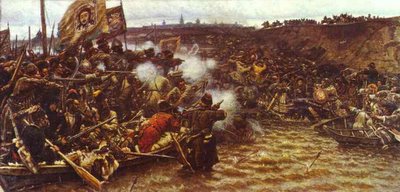
Kazan was captured from the Mongols in 1552. Ivan the Terrible was on the throne. From that time until 1917, the year of revolution, the Russian Empire expanded rapidly. “The Russians were driven east by fur, the ‘soft gold’ that accounted for 1/3rd of the Imperial coffers."2
1. Introduction
2. History of Halliburton and TNK
3. Focus on Samotlor Oil Field
4. History of TNK-BP
5. Gallery - Russian Fields
“The Urals are slipping behind us in forested shadows thrown low across the horizon, substanceless. Rain is falling like a mist. And slowly the West Siberian Plain surrounds us with the watery infinity that since the last Ice Age has slumbered here between the Arctic and Central Asia. Early Siberians imagined that in mid-creation this muddle of earth and water had been forgotten by God. But beneath it lie the richest oil fields in the world.”3
On May 29, 1965, ‘black gold’ was discovered for the future use of a different kind of Empire. The chief of the Megion oil-exploration expedition radioed to the chief of the Tyumen4 Geology-Prospecting Board : "By P-1 of Samotlor 2123-2130 m the first oil gusher was received. Visual debit exceeds 300 cubic m per day". Samotlor Field, is located at Lake Samotlor in the Urals Federal District, Siberia.
TNK-A (Tyumen Oil Company) was owned by Roman Abramovich
and Mikhail Freedman5, two members of the retro Oligarchy.

Mr. Freedman is reputed to be the 9th richest man in the world under 40, worth more than £5.2m. net.
Mikhail Freedman
Oil and Corruption go together like Sex and Lies. TNK-A’s roots were embedded in a legacy of KGB and Communist Party corruption, “as well as drug trafficking and organized crime funds, according to Russian and U.S. sources and documents. The claims were hotly disputed by the Russian oil firm’s holding company.”
The Russian corporate oil ‘musical chairs’ game commenced and over the years became so convoluted that an understanding of this jigsaw puzzle becomes next to impossible. I thus apologise for any errors, and ask for correction where needed.
In 1995, there were 22 major Russian oil companies.
In the West, the United States and Britain joined together for western oil control in January 1988. The Wall Street Journal announced that Standard Oil had merged with British Petroleum. “The new firm was called BP-America. BP-America then merged with, or controlled, all of the old Standard Oil "mini-companies." The new Standard Oil regime became known as BP-AMOCO.
In January, 1994, the US Export-Import Bank (Ex-Im) financed a $279m contract in which Halliburton Energy Services supplied oil drilling equipment to Tyumen Oil Company (TNK) for crude petroleum production in Samotlor. This contract (AP067280) was reported differently in the 1994 Ex-Im annual report, which described this as a $266.3m guarantee in which IRI International was to sell oil drilling equipment to Nizhnevartovskneftegaz, a subsidiary of Tyumen Oil.
Also in 1994, Dick Cheney, allegedly on a fishing trip with
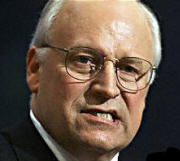 Halliburton CEO Thomas H. Cruikshank, and other captains of industry in New Brunswick, was asked if he would be willing to become Halliburton’s CEO. Vice President Cheney then became Halliburton CEO from 1995 – 2000. The company's revenues rose from $5.7bn in 1994 to $14.9bn in 1999. “You’ve got to go where the oil is,” he said.
Halliburton CEO Thomas H. Cruikshank, and other captains of industry in New Brunswick, was asked if he would be willing to become Halliburton’s CEO. Vice President Cheney then became Halliburton CEO from 1995 – 2000. The company's revenues rose from $5.7bn in 1994 to $14.9bn in 1999. “You’ve got to go where the oil is,” he said.Richard Cheney
1996 in Russia saw Boris Yeltsin become President, creating an illusion of stability. Gazprom ran the enormous gas reserves, but no such luck for the oil fields which, large and small, were taken over by oil barons. The largest companies were: Lukoil, Yukos, Sibneft, Rosneft, Tatneft, Sidanco, Surgutneftegaz, Slavneft, and Tyumen Oil. Banks rushed in.
In 1997, Alfa-Group7 bought the Tyumen-owned JSC Ryazan Oil refinery. The takeover was very complicated and fraught with various allegations of impropriety. By February, 1998, Alfa Group owned 51% of Tyumen holdings.
In August 1998, the banks rushed out as quickly as they had rushed in. In November, the Moscow Times reported, “the mess at Nizhnevartovsk is severe. The company’s vast Samotlor deposit in 1985 produced a staggering
 140 million metric tons of oil, representing half of the Soviet Union’s total production. (In 1997) it produced only 20.9 million tons and is now one of the nation’s most decimated deposits.... There is still plenty of oil left in Samotlor, but getting it out will require billions of dollars in new technology.”
140 million metric tons of oil, representing half of the Soviet Union’s total production. (In 1997) it produced only 20.9 million tons and is now one of the nation’s most decimated deposits.... There is still plenty of oil left in Samotlor, but getting it out will require billions of dollars in new technology.”Nizhnevartovsk, the “town of oil”
on the River Ob.
on the River Ob.
In April 1999, Halliburton8 began work for TNK at Samotlor under a contract which would last for three years. In May 1999, Halliburton Energy Services (HES) announced that its alliance with Tyumen Oil in Russia was “moving forward.9 “ The initial efforts would be directed towards the four western Siberia fields. By 2001, Houston-based Halliburton was advising on drilling strategy at TNK’s big Samotlor field in Western Siberia.
In 1999, the oil company, Chernogreft, who had close ties with BP-AMOCO, and who owned half the Siberian oil field with Tyumen, went ‘mysteriously’ bankrupt. Tyumen had their share of the oil field for only $176m.
In 2000, Cheney moved from CEO of Halliburton to the Vice Presidency of the United States. He still draws annual income from Halliburton. David Lesar became CEO of Halliburton.
David Lesar - CV
- August 2000 - Present
Chairman of the Board, President and Chief Executive Officer, Halliburton - June 1997 - August 2000
President and Chief Operating Officer, Halliburton - June 1996 - June 1997
President and Chief Executive Officer, Brown & Root, Inc.10 - June 1995 - June 1996
Executive Vice President and Chief Financial Officer, Halliburton - December 1993 - June 1995
Executive Vice President of Finance and Administration, Halliburton Energy Services
After March 2000, public reinvestment started again following the election of Putin. The Export-Import Bank, whose funds were appropriated by a Republican-dominated Congress, were prepared to back private banks, and approved financing for U.S. oil industry exports to Russian’s Tyumen Oil Company. Nearly $500m in loan guarantees were authorized to support exports by ABB Lummus Global11, Halliburton and more than 25 other U.S. suppliers.12 Halliburton was acting as an export for U.S. equipment suppliers, mainly Ford Motor Company and Sperry-Sun Drilling Services. Also mentioned were Leonard Engineering and its storage tanks and related equipment; the contractor, Canadian Fracmaster; the investor Gulf Canada, and a financier, (U.S) Citicorp. The transactions approved were for the Ryazan Oil Refinery (Chase Manhatten: $197.6m) and the Samotlor Oil Refinery (Commerzbank AG, NY: $292m)13 More
In October, 2000, TNK regained control of Ryazan Oil Refining Company and owned 75% of RNPK shares.
“In December, the Ex-Im Bank was directed by the White House and State Department to delay approval of the $489m credit guarantee … Western investors and companies, in an unrelated dispute, felt they had been defrauded by Tyumen. One of the firms was BP-AMOCO, the largest gas and oil producer in the United States, who claimed that Tyumen had effectively “stolen” a vast oil field in which they held substantial equity.” (see above, 1999) BP-AMOCO commissioned a report that was handed over and labeled “criminal situation” by the CIA. More
By 2001, CEO of Tyumen Oil Co., Simon G. Kukes 14 had installed a 300+ Halliburton contractor team at Nizhnevartovsk.
In October, 2001, BP signed a contract with Tyumen, announcing a joint venture with the company to develop the Kovytka gas reserve in Irkutsk.
In February 2002, Halliburton International Inc. signed an agreement with the Russian oil company, SIBNEFT, that would give Halliburton the “ability to deploy all of its product service lines to the Russian oil and gas market.” Halliburton is still, in 2005, working with TNK/BP, with offices in Moscow.
In September, 2005, a 72.7% stake in SIBNEFT was bought by Gazprom whose CEO is Alexander Ryazanov.15

“West Siberia is the dominant petroleum basin in Russia, producing 75% of all Russian oil and gas,” Ulmishek, Russian oil expert at the U.S. Geological Survey, said. “It’s the second richest basin in the world, second only to the Middle East, with huge reserves and very substantial undiscovered resources.”
Intensive development had depleted the Samotlor reserves. According to the U.S. Energy Information Agency, “the decline in the super-giant, West Siberian Samotlor field alone was responsible for roughly 35% of the production decline in Russia since 1988.” The field was considered to be almost depleted - further hurt by the injection of water, resulting in water mixing with the oil. With new technology, the field is being revived.
The Samotlor Field is now part of the BP oil empire in Russia. TNK-BP will hold the license to this field through 2013.
4. History of TNK-BP


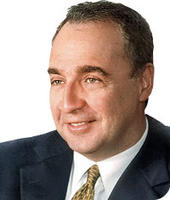 BP entered the Russian oil game in 1997, when it bought 10% of SIDANKO for $484m. A legal dispute raged between Freedman, Vekselberg and Blavatnik, the owners of TNK and SIDANKO, which remained unresolved until 2001.
BP entered the Russian oil game in 1997, when it bought 10% of SIDANKO for $484m. A legal dispute raged between Freedman, Vekselberg and Blavatnik, the owners of TNK and SIDANKO, which remained unresolved until 2001.Blavatnik Vekselberg
Former Chief Operating
Officer for TNK-BP
Officer for TNK-BP
In January 2002, Group Alpha Consortium announced that “Britain’s BP had held talks that might ‘lead to its biggest Russian oil investment yet via a stake in TNK – a firm that was its bitterest adversary there until last year.” SIDANKO, meanwhile, was in merger talks with TNK. More
Legal suits concerning price fixing surrounded Group Alpha and Renova. “Asked about the potential for BP to find itself being financially liable for any historical problems run up by TNK, the British oil executive said: "We have some indemnities that protect us very clearly from past activities."
In 2003, TNK (Tyumen Oil Co.) and SIDANCO officially joined hands with British Petroleum (BP). BP’s need for reserves and TNK’s need for Western-style technology and management skills created a mutually beneficial partnership, said chief operating officer for Teton Petroleum Company, Effimoff. TNK-BP made plans to extend the oil output. Halliburton had been enlisted to help work-over Samotlor’s 14,000 wells. The purchase would transform BP from a company producing three million barrels per day to one producing four million.
BP paid around $7bn., half in cash, for the deal. 50% of the shares of TNK-BP are owned by BP. The other 50% are owned by a group of prominent Russian investors: Mikhail Freedman’s Alfa Group, Access Industries and Renova (AAR). The shareholders of TNK-BP also own close to 50% of Slavneft. The purchase has enabled BP to rival Royal Dutch/Shell Group in terms of daily oil and gas output.
TNK-BP is now the biggest privately owned company in Russia, and is headquartered in Moscow with its financial base in the Virgin Islands. TNK-BP, Russia’s second largest oil company is, effectively, the Russian arm of British Petroleum. BP did not buy into a corruption-free corporation. As discussed above, TNKA was reputed to be one of the most notoriously criminal oil corporations. Abromovich, valued in 2004 at $10.6bn by Forbes 16, skedaddled to the UK and the Chelsea football team. He sold his last big stake in the oil firm, Sibneft, to Gazprom17 for £7.4bn in September 2005. Freedman, Chairman of Alpha Group, remains one of the main shareholders of TNK-BP, and is reputed to be worth $5.4bn
The CIA released their document (see above) in which alleged bribery by Simon Kukes, former TNK President, took place, said The Guardian.
TNK-BP were, in April of this year, charged with “Back-Tax” claims. TNK had, it was said, economized on its taxes by using onshore tax havens between 2000 and 2003 before its merger with BP. ‘This is a very bad surprise” (sic),” Dow Jones Newswires quoted TNK-BP Executive Director Viktor Vekselberg (Russia’s 3rd wealthiest person) as saying when attended the Russian Economic Forum in London.
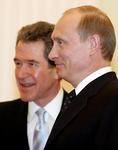
In April 2005, President Putin met with BP CEO Lord John Browne, Victor Vekelsburg and M. Freedman to “reassure” them, thereby lending Browne official support to the TNK-BP regulatory worries. There were further concerns, as the government wanted to “put specific limits on the participation of foreign companies in a limited number of deposits.”
Browne and Putin
In May ’05, an Industry and Energy member said “ the company does not submit information on the field to the state reserves commission on time, or infringes production norms. But systematic non-observance of the geological exploration schedule – that is very serious… Director Sergei Oganesyan earlier expressed concern that growth in oil production was being accompanied by a significant number of violations. He added that “Today, unfortunately, everybody is blinded by large oil production and the very high prices.” A TNK-BP source said that they had not received any official notification of violations during the development of Samotlor. More
These problems are probably not overly serious for Lord John Browne, who took the BP reins from Lord Simon in 1995. BP then proceeded to bring the two US corporations, Amoco (1998) and ARCO (1999) along with the UK’s Burmah Castrol (2000), into the BP fold. Browne has since made BP a colossus, equal to Shell in size, and perhaps with an even greater growth pattern.18
At the recent All-Russia week of oil and gas, the Executive Director of TNK-BP reported that the volume of capital investments of TNK-BP in 2006 will total over US $2 billion.
In Part II: Corporate Power: The New Russian Tsar, I will discuss BP's Lord Browne and his friend, Tony Blair, and their marriage to corporate power; and the one unassailable law of The Corporation.
Footnotes
1. Vasily Surikov Back
2. Figes, Orlando, Natasha’s Dance, Penguin Books, London, 2003, p. 377
[ Back ]
3. Thubron, Colin, In Siberia, Penguin Books, London, 2000, p. 19
[ Back ]
4. Tyumen: the first Russian town in Siberia, founded in 1586 on the site of the Tatar town of Chimgi-Tura. See also here
[ Back ]
5. Also spelt Friedman; Fridman
[ Back ]
6. Halliburton Watch See, for Halliburton in Iraq, Money for Nothing
[ Back ]
7. Alfa Group Consortium is one of Russia's largest privately owned financial industrial conglomerates, with interests in oil, commodities trading, commercial and investment banking, insurance, retail trade, food processing, and telecommunications.
[ Back ]
8. Halliburton Watch. See also: Halliburton News and Information Links
[ Back ]
9. Tyumen’s lead attorney at Akin Gump is James C. Langdon Jr., a managing partner at the firm. He is also one of George W. Bush’s "Pioneers,” one of the elite fund raisers who have brought in at least $100,000.
[ Back ]
10. Brown and Root, Inc. is the Halliburton business unit providing engineering and construction services in the petroleum, forest products, civil, manufacturing, environmental, maintenance and government markets.
[ Back ]
11. ABB Lummus Global, Inc., Contractor. ‘Tyumen hired ABB to modernize the Ryazan refinery. Criterion Catalyst Company (Houston) was the primary supplier for the refinery upgrade project. Other TNC involvement: John Brown Engineering & Construction (engineering, management of unit installation); BP-Amoco (technology, management through Amoco Eurasia subsidiary.”
[ Back ]
12. For the Ryazan oil refinery, other U.S. suppliers included Criterion Catalyst Company, Asea Brown Boveri Inc., UOP Engineered Products, BW/IP International Inc., and DI - Compressor Group, all in Houston, Texas; and Connell Limited Partnership in Tulsa, Okla.
[ Back ]
13. Different figures given are: Ryazan: $198m; Samotlor: £334m. http://www.profundo.nl/publicaties/siberia.html
[ Back ]
14. Kukes: http://www.sourcewatch.org/index.php?title=Simon_G._Kukes
[ Back ]
15. “Gazprom is buying Sibneft from Millhouse Capital, which is registered both in Russia and Britain. Sibneft has never disclosed who owns Millhouse, but the company says the core shareholders of Sibneft include Roman Abramovich and other members of the management team.”
http://www.themoscowtimes.com/stories/2005/10/19/041.html
[ Back ]
16. or $12.5bn
[ Back ]
17. Gazprom is now Russia’s biggest company, and thus a global giant.
[ Back ]
18. BP is presently looking into investments in the Sakhalin Kovykta gas field project in the Pacific Rim; and to the Arctic border where environmentalists and an aboriginal people have been struggling for their rights. See Bakan, J., The Corporation, Constable and Robinson Ltd., London, 2004, pp. 43 - 5
[ Back ]
Updates
27.07.06. Mosnews. Former NATO Chief Robertson Gets Top Post in Russia’s TNK-BP.
5. Gallery : Russian Fields
Part II: Corporate Power: The New Russian Tsar
Part III: Russian Oil: Propaganda and Protest
Sarah Meyer is now a researcher, living in Sussex, England.
Her blog is at http://indexresearch.blogspot.com.
You can email her at: sarahmeyer@freedom255.com

This work is licensed under a Creative Commons License.
Tags: TNK-BP, BP, oil, Samotlor, Halliburton,Mikhail Freedman, Cheney,Putin,Robertson
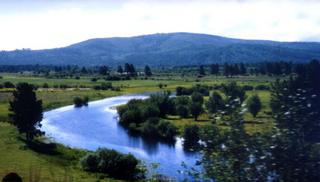



 Naomi Klein
Naomi Klein 


<< Home